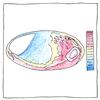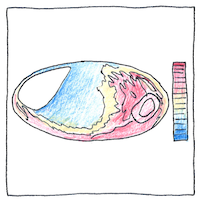Victor Francis Hess
physics

|
Cosmic rays
If ions in our atmosphere were created by radioactive minerals, then they would become rarer and rarer further and further from the surface of the earth. Victor Francis Hess ascended in balloons over three miles up to test this hypothesis. When his electrometer showed that the ionization rate gradually diminished until passing the altitude of 4900 feet when it began to gradually increase Hess realized previously unknown radiation penetrated deep into our atmosphere.
From the cosmos
High-energy particles mostly helium nuclei single protons are hurled from the Sun, hurled from supernovas, and hurled from active galactic nuclei by strong magnetic fields associated with black holes. These particles ionize nitrogen and oxygen, deplete our protective ozone, produce a fairly constant supply of carbon-14, and other radioactive isotopes— tritium, beryllium-7, sodium-24, magnesium-28, silicon-32, phosphorus-32, sulphur-38, chlorine-39, argon-39, and krypton-81 and 85. Few of these effects are particularly good for us. Slippery particles from the cosmos cause avalanches of electrons that trigger lightning strikes. Careening particles from the cosmos alter the states of elements in our computers to cause random errors. Fierce particles from the cosmos are responsible for an unlucky thirteen percent of the background radiation on Earth, causing genetic mutations and ten percent of our cancers.
Danger, danger!
Cosmic rays pose a significant risk to astronauts and other space travelers. Akin to Superman’s Achilles’ heel of heroic myth, exposure to the fictional derivative of krypton, kryptonite, paralyzed the most powerful and gave cancer to the evil Lex Luthor. Even ordinary humans on Earth are harmed every day. Stress in the workplace is more than bad enough. Semis jack-knifing on freeways, salmonella from unhygienic kitchens, are not easily distinguished from paranoias and hypochondrias, but if we learn to live well then we learn to ignore inevitable risks.



Rare and random events are not reproducible scientifically, so that to claim any such event as a possible cause for a tragic outcome were to declare oneself unable to objectively think about it. How can one think objectively about life or death? The business of philosophy and religion, it seems, is to ask questions more than to answer them.
See also in The book of science:
Readings in wikipedia: